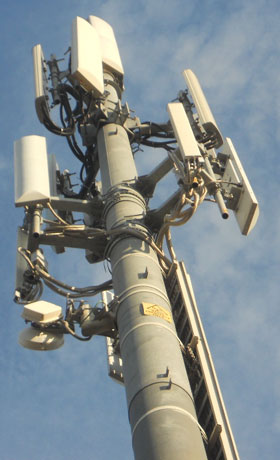 Attacks claimed by Nigerian Islamist group Boko Haram targeting mobile phone towers in recent days have also left 15 people dead and buildings burnt, including two schools, officials said Friday.
Attacks claimed by Nigerian Islamist group Boko Haram targeting mobile phone towers in recent days have also left 15 people dead and buildings burnt, including two schools, officials said Friday.
More than two dozen mobile phone towers for various providers have been destroyed in cities across northern Nigeria this week, marking a new type of attack from a group that has become notorious for deadly gun and bomb assaults.
Police said that two primary schools, a fire station, an electoral office and two religious affairs buildings were also burnt in the northeastern city of Damaturu, which has been hard hit by Boko Haram.
“The attackers also burnt down two primary schools, an electoral office, the fire service, the pilgrims’ welfare board and the ministry for religious affairs,” said Patrick Egbuniwe, police commissioner for Yobe state, where Damaturu is located.
Egbuniwe confirmed that five people were killed during the attacks on the mobile phone towers in Damaturu, but a hospital source put the death toll at 15, including a protocol officer for the state government.
“Thirteen bodies were brought to the morgue Wednesday night following explosions and shootings around telecom masts,” the source said on condition of anonymity.
“The bodies were brought in by soldiers. Two more bodies were brought Thursday morning. We have 15 bodies in all. They all have gunshot wounds.”
Boko Haram claimed the attacks on mobile phone towers in a statement on Thursday, alleging telecommunications providers had assisted authorities in investigating the group.
It also threatened journalists for Voice of America radio, which operates a Hausa-language service listened to throughout Nigeria’s north.
The threat follows a recent VOA report quoting a supposed Boko Haram spokesman saying dialogue was currently underway with the government.
Boko Haram has previously threatened journalists it accused of misrepresenting it and bombed the Abuja offices of one of the country’s most prominent newspapers in April.
The group is accused of killing more than 1 400 people since 2010 in its insurgency. It has demanded the creation of an Islamic state in Africa’s most populous nation and largest oil producer, though its demands have repeatedly shifted. — Sapa-AFP




